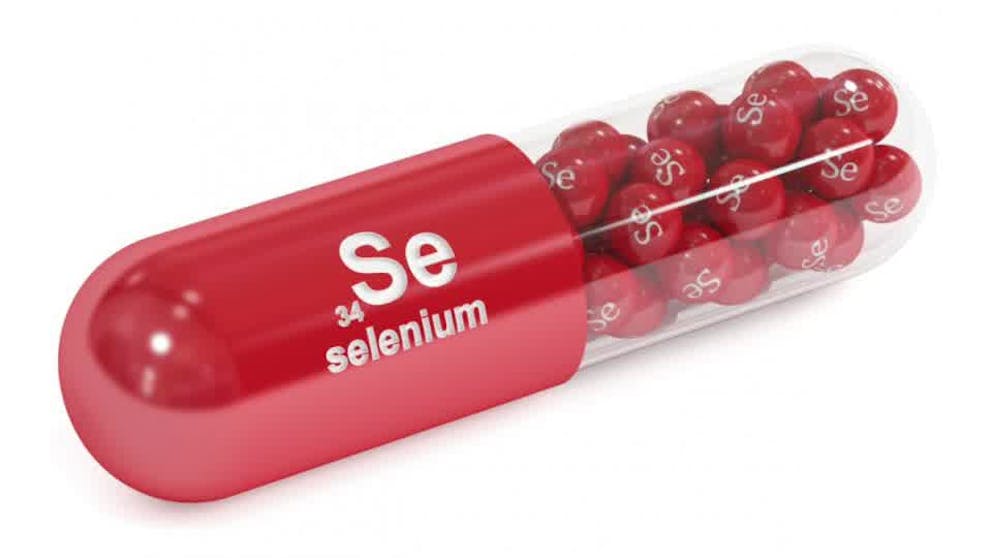The #1 Most Important Nutrient for Hypothyroidism
The #1 Most Important Nutrient for Hypothyroidism
Imagine a tiny yet mighty mineral-playing superhero in your body—selenium is just that for your thyroid. Those struggling with hypothyroidism know the drill: fatigue, weight gain, and feeling like you're moving through molasses.
But what if I told you selenium could be the sidekick your thyroid has been waiting for?
We're about to dive into why this nutrient is a game-changer for folks facing off against hypothyroidism. From helping produce essential hormones to shielding your gland from cellular bad guys, selenium's more tricks up its sleeve than you might think.
Get ready; we'll unpack how this powerhouse can transform autoimmune defenses, fight oxidative stress, and ensure hormone production stays on track. And when it comes to having a snack selenium-rich foods or considering supplements—we've got the scoop there, too.
Selenium's Role in Thyroid Hormone Production
Think of your thyroid gland as a car engine that runs on hormones; it needs selenium like an engine needs oil.
This trace mineral is like a vital cog in the hormone production machine, ensuring everything ticks smoothly. Without enough selenium, your body can't produce proper thyroid hormones.
The Biochemical Influence of Selenium on Thyroid Function
Selenium has its hands in many pots, but one of its key roles is to act as a catalyst for the enzyme deiodinases.
These enzymes are responsible for converting thyroxine (T4) into triiodothyronine (T3), which is the active form our bodies can use, according to research by the Office of Dietary Supplements.
It doesn’t stop there, though; selenium also helps protect against excess hydrogen peroxide produced during hormone synthesis—a substance that could otherwise spell trouble for your thyroid cells.
This delicate balance isn't just about keeping levels steady; it’s also crucial when autoimmune conditions enter the picture.
With adequate selenium, you're throwing up a shield against unwanted immune system attacks that could lead to hypothyroidism or even Graves' disease.

Selenium and Autoimmune Thyroid Conditions
Think of selenium as a security guard for your thyroid, especially in autoimmune conditions like Hashimoto's disease. It doesn't just stand by; it actively keeps the peace. Maintaining proper levels can be a game-changer in preventing the onset of these pesky problems.
Preventing Autoimmune Complications with Adequate Selenium
You wouldn’t skip out on car insurance before a road trip, right? Similarly, you shouldn't overlook selenium if journeying through thyroid health land.
This mineral is crucial because studies show that sufficient amounts may prevent the immune system from mistakenly attacking its thyroid.
A lack of this nutrient has been linked to an increased risk of kick-starting autoimmune issues—something we'd all rather avoid. So, let’s keep those levels in check.
Thytrophin PMG and Autoimmune Support
If there were VIP tickets for managing autoimmune thyroid conditions, Thytrophin PMG would be front row and center stage. This supplement often gets two thumbs up from experts who recommend it for giving that extra support your body might need.
The gist is simple: bolster your defenses naturally so you can tell any potential thyroid drama to take a hike.
Antioxidant Properties of Selenium in Thyroid Health
Selenium doesn't just strut around your body like a health-conscious superhero for kicks. This essential mineral packs an antioxidant punch for kicking oxidative stress to the curb, especially within the thyroid gland.
Why is this big news? When your thyroid works overtime to pump out hormones, it also produces hydrogen peroxide as a byproduct—like exhaust from a car.
Combatting Oxidative Stress in the Thyroid Gland
Oxidative stress can be a real party pooper inside your thyroid; it's basically like having unwelcome guests crashing on your couch every night.
But here comes selenium with its trusty sidekick glutathione—the detoxifier extraordinaire—to clean up that mess and give those free radicals an eviction notice.
Your little butterfly-shaped gland needs all the help it can get dealing with these metabolic byproducts because they're annoying and can cause damage if left unchecked. Think about how rust attacks metal; now, imagine that happening inside you.
That's why getting enough selenium through foods or supplements is vital—it lets you host that inner party without worrying about pesky crashers wreaking havoc.
Dietary Sources of Selenium
Thyroid health is no laughing matter, and Selenium steps up to the plate like a home-run hitter in a clutch game. It's found hanging out in foods we love, ready to give our thyroid gland that extra boost.
Integrating Selenium-Rich Foods into Your Diet
You don't have to go on a wild goose chase for exotic ingredients; selenium-rich foods are probably already part of your kitchen lineup. Meats—think beef, turkey, chicken—are packing some severe selenium punch.
If you're a pescatarian or just enjoy seafood vibes, fish like tuna and halibut will be your best pals here.
Veggies haven't been left behind, either. Who knew those cruciferous vegetables you side-eye at dinner were secret selenium superheroes? Broccoli and Brussels sprouts aren’t just about Vitamin C—they’re also excellent sources of this essential mineral.
For snackers and breakfast champions alike, eggs are an easy win and dairy products for their calcium-selenium tag team effect.
Nuts about nuts? Brazil nuts lead the pack but munch responsibly since they bring potent doses per bite. And let’s not forget garlic and onions – these flavor enhancers do double duty, fortifying your thyroid, too.
The Therapeutic Effects of Selenium on Thyroid Pathology
Selenium plays a tough bodyguard for your thyroid, shielding it from the damage that can lead to conditions like Graves' disease. This mineral is like a utility player in sports; it's involved in many crucial processes but doesn't always get the spotlight.
When you're dealing with Graves' disease, selenium steps up its game. It's been shown to tone down one of the most noticeable symptoms: bulging eyes. This symptom reduction is not just about looks; it is also about comfort and eye health.
Plus, selenium isn't only focused on what's happening now—it has an eye on your future, too, by decreasing risks linked with thyroid nodules and keeping enlargement at bay.
Your thyroid knows how vital selenium is—that’s why it has particular ways to hang onto this nutrient through accumulation and recycling mechanisms. Think of these as 'savings accounts' specifically for selenium so your thyroid never runs low on funds.

Recommended Intake and Supplementation Strategies for Selenium
Selenium isn't just another item on the periodic table; it's a VIP in thyroid health. Think of your thyroid as a high-powered executive that needs the right team to thrive, and selenium is like its ace assistant.
To keep this exec running smoothly, you need 200 micrograms of selenium daily—no more briefcases full of pills required.
We get it from what we eat: meat, fish, eggs—you name it. But sometimes food alone doesn't cut it, especially with soil depletion being a buzzkill for nutrient levels. That's when supplements step up to the plate.
It's all about balance, though, because too much can be as problematic as too little. So, if you're thinking about supplementation strategies—maybe have a chat with your healthcare provider first. They'll help make sure you hit that sweet spot without tipping over.
Conclusion
Wrapping it up, the importance of selenium for hypothyroidism is evident. You've seen how this mighty mineral fuels hormone production and arms your thyroid against oxidative foes.
Dive into those selenium-rich foods; they're tasty and armor for your health. Remember, 200 micrograms a day keeps the imbalance away.
Tackle autoimmune threats head-on with adequate intake. Whether through bites or supplements, ensure you get enough to stand firm against cellular invaders.
And remember: balance is essential. Too much of a good thing isn't always better—strike that sweet spot in your diet and thrive!
Supporting Data
https://www.ncbi.nlm.nih.gov/pmc/articles/PMC6178160/
https://www.mdpi.com/1420-3049/26/23/7084
https://link.springer.com/article/10.1007/s42000-019-00133-5
Previous blog
7 Top Supplements That REALLY WorkTags

Popular
08/21/2024
55K views
02/23/2025
46.3K views
11/18/2024
277.7K views
03/18/2024
11/21/2022




